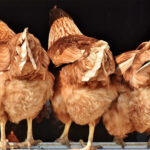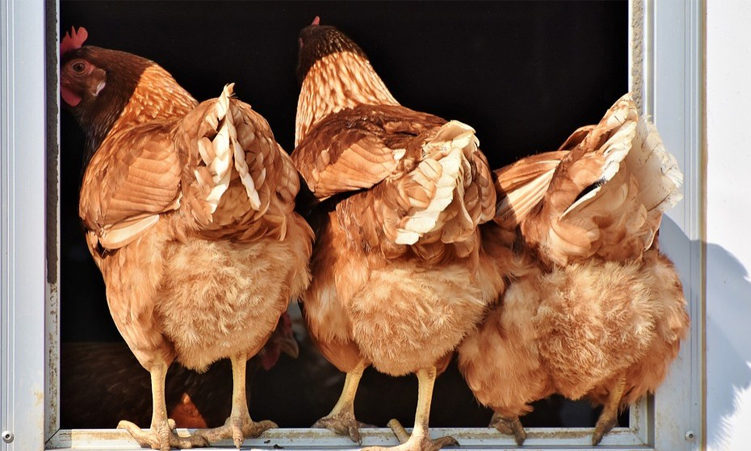The Poultry Producers Association (PPA) has predicted a tough two months ahead as a government ban on poultry imports from South Africa (SA) kicked in with immediate effect yesterday.
The neighbouring country is in the midst of a major bird flu outbreak which has since the beginning of 2023 seen in excess of five million commercial layer birds culled, and more than 2,5 million broilers killed.
The PPA yesterday said because of the threat to local operations posed by the disease outbreak in SA, it is happy the ban has been implemented.
PPA chairperson Rene Werner says this is a welcome development although the next two months will be tough – especially for budding small producers which depend on SA to replenish their stock.
“But this is a small price producers have to pay if you compare it to the price we have to pay if we get the disease in this country. The entire industry could be devastated and would most probably lose money until it is on its knees,” he says.
Werner says the association is looking for alternative sources from other neighbouring countries.
“I have found some suppliers already, but we have to see if they are up to standard before we import from them,” he says.
Werner says Namibia is self-sufficient in terms of egg production, and there are other options for poultry imports.
Windhoek agricultural economist Mally Likukela said the ban on the import of poultry from South Africa will create a shortage if supplies from other sources are guaranteed. This shortage would in turn drive inflation up and hit consumers, as chicken products would become more expensive.
‘DOUBLE-EDGED SWORD’
“This, however, is a double-edged sword in that while shortages may result in higher prices for chicken products, it also presents an opportunity for local producers to develop the industry and stop being the conveyor belt for South African farmers,” he said.
Namibia Agricultural Union economist Bertha Iiyambo said the import ban is good for the country as it protects not only producers but also their employees and families.
“Once there is an outbreak at a farm, all the chickens have to be culled and the farm will be out of production for some time,” she said, adding that the ban would allow South Africans to rectify the problem before they can export to Namibia.
Poultry farms are concentrated between Okahandja and Windhoek, and Iiyambo said if there is an outbreak, flocks within this radius will be wiped out.
She said the ban will hurt production, especially small producers, and South Africa was already having problems supplying Namibia due to their broiler flocks having been wiped out by the disease.
She said take-away establishments dealing in poultry products might spike prices which presents local producers with an opportunity to increase their presence in the market.
Commercial poultry producer Erastus Kadhikwa welcomes the ban.
“I say big ups to the government for acting promptly to contain the situation, because that is good for the industry,” he says.
“It is also an eye-opener for Namibian producers to up their game and start thinking outside the box. We need to start producing our own parent stock or fertile eggs, and set up processing industries,’” he says.
Kadhikwa says while small producers will feel the pinch now, commercial farmers will feel the void around December and January next year when they need a new cycle.
There are, however, other avenues for producers to explore, he says.
“I am thankful to the government for the way they acted, because that is the right way to go. We have relied too much on the South African industry and it’s now time we developed our own Namibian producers,” he says.
According to a notice from chief veterinary officer Albertina Shilongo, the importation and in-transit movement of live poultry, fresh frozen poultry meat, table eggs as well as day-old chicks and hatching eggs from SA has been suspended until further notice.

‘ALARMING’
She says the suspension was prompted by the current alarming spread of the Highly Pathogenic Avian Influenza (HPAI) in commercial poultry in export-approved poultry compartments in South Africa.
“Therefore, there is a need to reinforce the control measures in order to prevent the possible introduction of HPAI into Namibia through the imports of poultry and poultry products,” she says.
Shilongo says reports from the South Africa Veterinary Competent Authority indicate that there were 49 new HPAI cases from 18 April to 5 September, of which 10 were confirmed to have been caused by HPAI H5 and 39 by the HPAI H7 strain.
Shilongo says all previously issued import and in-transit permits have been cancelled and recalled with immediate effect.
However, she says cooked poultry meat products for commercial purposes may still be imported into Namibia or in-transit under the veterinary import permit.
According to News24, South African poultry producer Quantum Foods said last week that the outbreak had killed about two million chickens.
Another South African poultry producer, Astral Foods , said the total cost associated with the outbreak amounted to about R220 million.
Namibia consumes an estimated 2 500 tonnes of chicken every month, relying on imports mainly from SA.
SA publication Farmer’s Weekly said the outbreak, which is being described as one of the most devastating to hit South Africa since the H5N8 bird flu in 2017, has triggered fears that South Africans will soon be faced with extreme prices for chicken meat and eggs, as well as chicken meat and egg shortages.
It further reported that according to South Africa’s Department of Agriculture, Land Reform and Rural Development (agriculture department), as of 21 September, the country has experienced a total of 50 outbreaks of the H7 strain of bird flu, and 10 outbreaks of the H5 strain of bird flu.
The H7 strain has reportedly not been documented anywhere else in the world.
VACCINE
The department announced on Monday night that it had met with vaccine registration regulators and reached an agreement “that the registration of [a bird flu] vaccine [would] be fast-tracked” in an effort to control the outbreak.
Agriculture department spokesperson Reggie Ngcobo said the department had already facilitated the importation of fertile eggs for the broiler industry.
– email: [email protected]
The post SA poultry ban expected to push up Namibian prices appeared first on The Namibian.




Leave a Reply